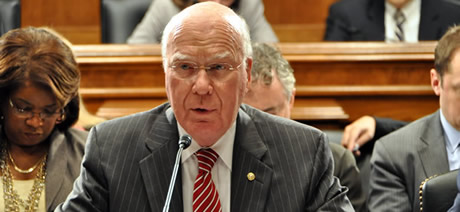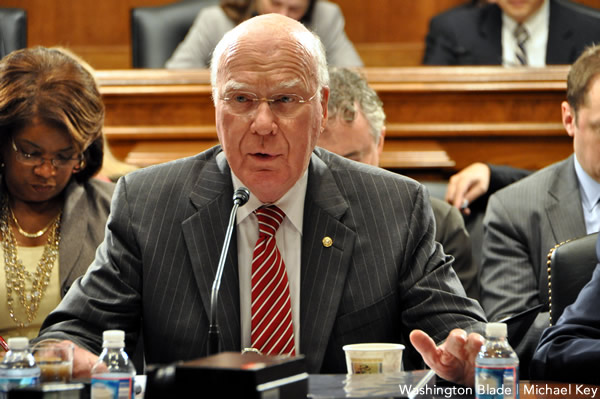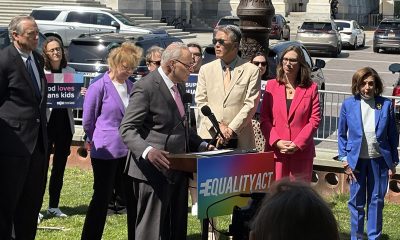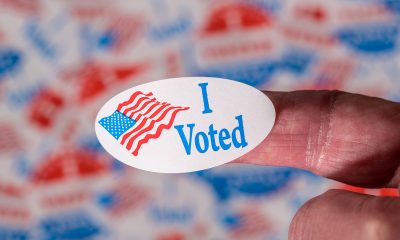News
Leahy withholds amendments for gay couples in immigration bill
In tearful speeches, Dems says time is wrong for measures


Sen. Patrick Leahy (D-Vt.) withheld UAFA as a committee amendment. (Blade file photo by Michael Key)
Senate Judiciary Committee Chair Patrick Leahy (D-Vt.) on Tuesday withheld amendments to include gay couples as part of immigration reform in the aftermath of speeches — sometimes tearful — from Democrats on the panel who said they couldn’t support the measures.
After an extended speech on why he believes discrimination against gay couples is wrong — Leahy said “with a heavy heart” he wouldn’t introduce the amendments before the Senate Judiciary Committee. They would have made bi-national same-sex couples equal under the law to straight couples for immigration purposes.
“In the immigration context, if you’re an American and fall in love will someone of the same sex from a different country and you get married legally, your spouse will not be treated like any other immigrant spouse would be by your federal government,” Leahy said. “My amendments would change that. I don’t want to be the senator who asks Americans to choose between the love of their life and the love of their country.”
During his remarks, Leahy asked members of the “Gang of Eight” who produced the base bill and were also members of the Senate Judiciary Committee why they decided to exclude gay couples from the initial legislation.
Under current law, gay Americans are unable to sponsor their foreign partners for residency in the United States — even if they’re married — unlike straight Americans. For couples that are married, that’s because of the Defense of Marriage Act, which prohibits federal recognition of same-sex marriage. LGBT advocates had been pushing Congress to rectify this issue as part of comprehensive immigration reform.
Two amendments were proposed by Leahy. One mirrored the Uniting American Families Act, which would enable gay Americans to sponsor their foreign partners for residency in the United States. The other would have allowed for the approval of marriage-based green card applications for married same-sex couples.
Democrats who are known for being LGBT rights supporters — Sens. Chuck Schumer (D-N.Y.), Al Franken (D-Minn.), Dianne Feinstein (D-Calif.) and Richard Durbin (D-Ill.) — said they were torn on the issue, but couldn’t support the amendments out of fear they would lose Republican support and it would kill the legislative package.
Feinstein said the Supreme Court, which is currently considering the constitutionality of DOMA, may make the issue “moot” because a ruling against the anti-gay law in June would end federal discrimination against married same-sex couples.
“We now know that this is going to blow the agreement apart,” Feinstein said. “I don’t want to lose Sen. Graham’s vote because Sen. Graham’s vote can represent and be used as the rationale for dozens of other [lawmakers] who then will not vote for the immigration bill. … I am for what Sen. Leahy is proposing, I would just implore to hold off on this amendment at this time.”
Schumer, a member of the “Gang of Eight,” said he tried to persuade other senators to support the idea and believes current law is “rank discrimination,” but can’t bring himself to support the amendments because of Republican opposition.
“If we make the effort to add it to this bill, they will walk away,” Schumer said. “They’ve said it publicly, they’ve told me privately — I believe them. The result: no equality, no immigration bill. Everyone loses.”
Prior to the vote, Schumer was targeted by LGBT groups for being the only Democrat on the committee to not voice support for including UAFA as part of the larger package.
Durbin was particularly emotional and had tears in his eyes as he explained why they couldn’t support the measures. A member of the “Gang of Eight,” Durbin said he supports UAFA, but doesn’t see immigration reform as the best vehicle for the measure.
“I believe in my heart of hearts that what you’re doing is the right and just thing … but I believe this is the wrong moment, this is the wrong bill,” Durbin said. “There are approximately 250,000 LGBT undocumented immigrants in America that would benefit from passage of immigration reform. I want to make certain they have that chance.”
LGBT rights groups responded to the committee’s exclusion of same-sex couples from immigration reform with vocal disappointment.
Rachel Tiven, executive director of the LGBT group Immigration Equality, attended the markup and — while she said she’s “proud’ of Leahy for his support — expressed frustration with other Democrats.
“I’m very proud of Sen. Leahy; I’m very dismayed that his colleagues did not stand up with him to talk about the dignity of LGBT immigrant families,” Tiven said. “Only Sen. Leahy talked about the LGBT immigrants that he represents who have dreams, too, and who want to see a good bill passed that will help everyone, and who need immigration reform as badly as any other immigrant.”
Tiven named Democrats on the panel with whom she was particularly disappointed because of their previously articulated support for the LGBT community.
“To hear Sen. Durbin say, ‘Well, this is an outside issue like gun control,’ to hear that Sen. Franken didn’t speak up for families like Ginger and Ness Madeiros, whose visa runs out in August — what are they and their eight-month-old son going to do?” Tiven said. “I can’t imagine how they’re feeling right now about Sen. Franken. How could he not say these are immigrant families, too?”
With the exception of Schumer, Tiven maintained the Democrats on the panel expressed support for including same-sex couples in the reform package, which made their statements during the committee markup surprising.
But Republican members of the panel were most opposed to including the measures. They reiterated their opposition to including the measure in the package and said adopting them would break apart the coalition that helped put it together.
Sen. Lindsey Graham (R-S.C.), a Republican member of the “Gang of Eight,” said the legislation would lose support from evangelical Christians and the Catholic Church, who’ve supported the measure, if those protections were included.
“I support traditional marriage without animosity,” Graham said. “I’m not married; I guess that means maybe I shouldn’t speak at all about it, but I do believe that the people of my state, and the people of other states who have gone different ways than Vermont, believe it would throw the coalition out of balance.”
When Leahy asked Graham if anything in the amendments would require South Carolina to change its state law on marriage, Graham said no, but maintained it would be making him vote in favor of a concept he opposes.
“You got me on immigration; you don’t got me on marriage,” Graham said. “I can’t just tell any more directly; you want to keep me on immigration; let’s stay on immigration.”
Sen. Jeff Flake (R-Ariz.), another GOP member of the “Gang of Eight,” also said he expected the coalition that put the bill together to fall apart if same-sex couples were included.
“This is an issue that is being addressed by the courts right now, I think that it would certainly upset the coalition that we have,” Flake said. “Certainly, we in Arizona, like in South Carolina, have spoken on the issue. It would certainly mean that this bill would not move forward. That would be a real shame, given how far we’ve come and the work that’s gone into this.”
Winnie Stachelberg, vice president of external affairs at the Center for American Progress, pointed at Republicans as the reason why same-sex couples weren’t included in the legislation.
“We’re all disappointed that at this juncture in the process, a small handful of Republicans prevented the provision from being voted on, but we’ve got a long way to go in the process and we’ll continue to work hard to secure the votes on the floor if it comes up,” Stachelberg said.
Following the discussion on the Leahy amendments, the committee reported out the legislation by a 13-5 vote. Supporters of immigration reform in the room — largely members of immigrant community — chanted, “Yes we can! Yes we can!” and embraced senators who voted in favor of the legislation as they snapped photos with them.
According to a report from the Williams Institute, an estimated 275,000 undocumented LGBT Americans would have a path to citizenship as the legislation currently stands if it reaches President Obama’s desk and is signed into law.
In a statement after the vote, Obama, who called for a gay-inclusive bill as part of his vision for reform, commended the committee for completing work on the legislation and urged a floor vote as soon as possible.
“None of the committee members got everything they wanted, and neither did I , but in the end, we all owe it to the American people to get the best possible result over the finish line,” Obama said. “I encourage the full Senate to bring this bipartisan bill to the floor at the earliest possible opportunity and remain hopeful that the amendment process will lead to further improvements.”
Leahy’s announcement came after an Associated Press report saying the White House had asked the Vermont senator to hold off on offering the amendments until the measure goes before the full Senate.
It’s unclear whether Leahy will introduce the amendments once the legislation reaches the Senate floor, which is expected early in June. Passage on the Senate floor would be significantly more difficult than passage would have been in committee if a 60-vote threshold is necessary to overcome a filibuster.
After the committee reported out the bill, the Washington Blade asked Sen. Chuck Schumer (D-N.Y.) whether he wants to see UAFA brought up as an amendment on the Senate floor.
“You’ll have to ask Sen. Leahy about that,” Schumer replied. “As you heard, I believe strongly in UAFA. I don’t think I have to say anything more; I spoke long enough on it.”
Although the amendment for same-sex couples wasn’t included, the committee on Monday rejected an amendment that would have removed a provision supported by LGBT advocates that was included in the base bill.
Sen. Charles Grassley (R-Iowa) offered two amendments that would have eliminated the repeal of the one-year filing deadline for asylum seekers. One amendment failed on a vote of 6-12 and the other failed on a vote of 9-9.
LGBT advocates had supported that provision in the base bill because LGBT asylum seekers often don’t know they have a one-year deadline to apply for asylum in the United States, or lack financial resources to make the application.
Federal Government
UPenn erases Lia Thomas’s records as part of settlement with White House
University agreed to ban trans women from women’s sports teams

In a settlement with the Trump-Vance administration announced on Tuesday, the University of Pennsylvania will ban transgender athletes from competing and erase swimming records set by transgender former student Lia Thomas.
The U.S. Department of Education’s Office for Civil Rights found the university in violation of Title IX, the federal rights law barring sex based discrimination in educational institutions, by “permitting males to compete in women’s intercollegiate athletics and to occupy women-only intimate facilities.”
The statement issued by University of Pennsylvania President J. Larry Jameson highlighted how the law’s interpretation was changed substantially under President Donald Trump’s second term.
“The Department of Education OCR investigated the participation of one transgender athlete on the women’s swimming team three years ago, during the 2021-2022 swim season,” he wrote. “At that time, Penn was in compliance with NCAA eligibility rules and Title IX as then interpreted.”
Jameson continued, “Penn has always followed — and continues to follow — Title IX and the applicable policy of the NCAA regarding transgender athletes. NCAA eligibility rules changed in February 2025 with Executive Orders 14168 and 14201 and Penn will continue to adhere to these new rules.”
Writing that “we acknowledge that some student-athletes were disadvantaged by these rules” in place while Thomas was allowed to compete, the university president added, “We recognize this and will apologize to those who experienced a competitive disadvantage or experienced anxiety because of the policies in effect at the time.”
“Today’s resolution agreement with UPenn is yet another example of the Trump effect in action,” Education Secretary Linda McMahon said in a statement. “Thanks to the leadership of President Trump, UPenn has agreed both to apologize for its past Title IX violations and to ensure that women’s sports are protected at the university for future generations of female athletes.”
Under former President Joe Biden, the department’s Office of Civil Rights sought to protect against anti-LGBTQ discrimination in education, bringing investigations and enforcement actions in cases where school officials might, for example, require trans students to use restrooms and facilities consistent with their birth sex or fail to respond to peer harassment over their gender identity.
Much of the legal reasoning behind the Biden-Harris administration’s positions extended from the 2020 U.S. Supreme Court case Bostock v. Clayton County, which found that sex-based discrimination includes that which is based on sexual orientation or gender identity under Title VII rules covering employment practices.
The Trump-Vance administration last week put the state of California on notice that its trans athlete policies were, or once were, in violation of Title IX, which comes amid the ongoing battle with Maine over the same issue.
Congress
House Democrats oppose Bessent’s removal of SOGI from discrimination complaint forms
Congressional Equality Caucus sharply criticized move

A letter issued last week by a group of House Democrats objects to Treasury Secretary Scott Bessent’s removal of sexual orientation and gender identity as bases for sex discrimination complaints in several Equal Employment Opportunity forms.
Bessent, who is gay, is the highest ranking openly LGBTQ official in American history and the second out Cabinet member next to Pete Buttigieg, who served as transportation secretary during the Biden-Harris administration.
The signatories to the letter include a few out members of Congress, Congressional Equality Caucus chair and co-chairs Mark Takano (Calif.), Ritchie Torres (N.Y.), and Becca Balint (Vt.), along with U.S. Reps. Nikema Williams (Ga.), Hank Johnson (Ga.), Raja Krishnamoorthi (Ill.), Delia Ramirez (Ill.), Joyce Beatty (Ohio), Lloyd Doggett (Texas), Eleanor Holmes Norton (D.C.), Josh Gottheimer (N.J.), and Sylvia Garcia (D-Texas).
The letter explains the “critical role” played by the EEO given the strictures and limits on how federal employees can find recourse for unlawful workplace discrimination — namely, without the ability to file complaints directly with the Employment Opportunity Commission or otherwise engage with the agency unless the complainant “appeal[s] an agency’s decision following the agency’s investigation or request[s] a hearing before an administrative judge.”
“Your attempt to remove ‘gender identity’ and ‘sexual orientation’ as bases for sex discrimination complaints in numerous Equal Employment Opportunity (EEO) forms will create unnecessary hurdles to employees filing EEO complaints and undermine enforcement of federal employee’s nondiscrimination protections,” the members wrote in their letter.
They further explain the legal basis behind LGBTQ inclusive nondiscrimination protections for federal employees in the EEOC’s decisions in Macy v. Holder (2012) and Baldwin v. Foxx (2015) and the U.S. Supreme Court’s decision in Bostock v. Clayton County (2020).
“It appears that these changes may be an attempt by the department to dissuade employees from reporting gender identity and sexual orientation discrimination,” the lawmakers wrote. “Without forms clearly enumerating gender identity and sexual orientation as forms of sex discrimination, the average employee who experiences these forms of discrimination may see these forms and not realize that the discrimination they experienced was unlawful and something that they can report and seek recourse for.”
“A more alarming view would be that the department no longer plans to fulfill its legal obligations to investigate complaints of gender identity and sexual orientation and ensure its
employees are working in an environment free from these forms of discrimination,” they added.
Latin America
Protests, demands for rights define Pride month in Latin America
More than 3 million people participated in São Paulo march

Activists across Latin America marked Pride month with massive demonstrations, cultural activities, and demands that their countries guarantee equality and protect LGBTQ people from violence.
From Santiago, Chile, to Mexico City, activists took to the streets to celebrate the rights that have been won and the many that are still pending.
Chile
The Pride march that the Movement for Homosexual Integration and Liberation (Movilh) and Fundación Iguales organized took place in downtown Santiago, the country’s capital, on June 22. Authorities and the two organizations say more than 120,000 people participated.
Under the slogan “Pride with memory and hope,” marchers demanded lawmakers approve a bill that would allow reparations for LGBTQ Chileans who Gen. Augusto Pinochet’s dictatorship targeted. There were also calls for the government to promote an LGBTQ-inclusive educational reform.
“This time we are marching on high alert,” said Movilh spokesperson Javiera Zúñiga. “For the first time in decades, we are losing achieved rights. We demand the state wake up. The reform of the Zamudio Law has been stalled for 13 years.”
Marches also took place in Valparaíso, Antofagasta, Temuco, and Concepción, highlighting the growing visibility of transgender groups and feminist organizations.
Mexico
Mexico City on June 29 was the epicenter of one of the region’s largest Pride marches.
More than 300,000 people participated in the march. Comité IncluyeT organized the 46th annual march under the slogan “Not one step back: rights are respected.”
Several organizations denounced the increase in hate crimes — Mexico’s National Observatory of Hate Crimes notes more than 80 LGBTQ people have been reported murdered in the last year. They also urged Mexican lawmakers to criminalize transfeminicides across the country.
Argentina
Although Buenos Aires’s official Pride march takes place in November, the Argentine LGBT+ Federation and other groups in the Argentine capital and in other cities across the country in June organized activities.
More than 5,000 people on June 24 marched from Plaza de Mayo to the Argentine Congress to reject the government’s dismantling of public policies. President Javier Milei’s decision to eliminate the country’s Women, Gender, and Diversity Ministry and cut sexual health programs were among the moves the protesters denounced.
“Today Pride is also resistance to the adjustment,” pointed out Comunidad Homosexual Argentina, an LGBTQ advocacy group.

Colombia
Thousands of people in Bogotá, the Colombian capital, and the cities of Medellín, Cali, and Barranquilla marched on June 29.
The marchers’ slogan was “diversity is also peace,” in a context where violence against LGBTQ people remains high. Caribe Afirmativo, a Colombian LGBTQ rights group, notes more than 45 people from the community has been reported killed in the country over the last 12 months, with most of them trans women.
Organizations also demanded lawmakers resume debate of a bill that would extend comprehensive protections to LGBTQ Colombians. The measure has been stalled in Congress since 2023.
Brazil
More than 3 million people participated in the 28th São Paulo LGBTQ+ Pride Parade that took place on the city’s Paulista Avenue on June 22.
The parade took place under the slogan “LGBT+ social policies: we want the whole thing, not half of it.” Organizers demanded expanded access to health care, employment, and education for the most vulnerable communities, especially Black trans people. They also denounced ultraconservative figures who seek to curtail LGBTQ rights.
Peru and Paraguay
More than 15,000 people took part in a Pride march in Lima, the Peruvian capital, on June 28. Participants demanded lawmakers approve a trans rights law, which has been stalled in the Peruvian Congress since 2016, and recognition of civil unions.
Members of SomosGay, a Paraguayan LGBTQ rights group, and other organizations participated in a Pride march that took place in Asunción, the country’s capital, on June 29.
The march took place without incident, despite threats and anti-LGBTQ hate speech on social media. Participants demanded an end to anti-LGBTQ discrimination and rhetoric from social and religious groups.
Central America
Upwards of 2,000 people participated in a Pride march in Tegucigalpa, the Honduran capital, on June 22. A Pride demonstration took place in San Salvador, the capital of neighboring El Salvador, on June 28.
-

 U.S. Supreme Court4 days ago
U.S. Supreme Court4 days agoSupreme Court upholds ACA rule that makes PrEP, other preventative care free
-

 U.S. Supreme Court4 days ago
U.S. Supreme Court4 days agoSupreme Court rules parents must have option to opt children out of LGBTQ-specific lessons
-

 Television5 days ago
Television5 days ago‘White Lotus,’ ‘Severance,’ ‘Andor’ lead Dorian TV Awards noms
-

 Music & Concerts5 days ago
Music & Concerts5 days agoBerkshire Choral to commemorate Matthew Shepard’s life










